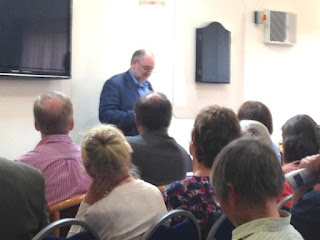I have been invited today to endorse a proposed amendment to the Party's Constitution, which reads;
In article 7.3 of the constitution, add to the end of the first sentence:
", and subject to the Leader's right to veto the inclusion of any specific policy."
What this means is that the Federal Policy Committee, which draws up the Party's manifestos for Westminster and Europe, shall retain its responsibility, subject to the right of the Leader to veto anything he or she doesn't like.
This amendment would, if passed, allow a Leader to conclude - I don't think that this policy is workable, so I'll veto it, even were it to be passed overwhelmingly at a Federal Conference. And, you see, a Leader isn't always right.
I am a bit of a process geek. I favour the notion of testing ideas through the filtration of Federal Conferences and Federal Policy Committee, because there is always someone who will, if given a chance, get up and say, "I think that you'll find that the 1846 Paper Clips Act makes the proposal unworkable.". Liberal Democrats can be pedantic like that, but good policy making requires exactitude and knowledge.
Yes, a Leader has people to do research for them, but my experience of a series of Leader's Offices is that 'group-think' tends to set in sooner rather than later. Which one of them wants to be the one to say to the Leader, "You're wrong on this one, Boss."?
We are also a Party which treasures its internal democracy, the right for all of us to have a say. What impression would it give for the Party to have a passionate debate over an idea, draw its conclusion and then have that overruled by one man or woman?
I do see a logic in the way Liberal Reform are thinking. Tuition fees turned out to be a disaster, and had Nick vetoed it before the General Election, we might not have had so many problems with the notion of trust. But, it wasn't about the policy, it was about what we did with the policy, about the pledge that so many of our people signed in 2010, and how we dealt with it in Government.
My apologies, ladies and gentlemen of Liberal Reform, but you do not address a misjudgement by the leadership of a political party by giving that leadership more power. And so, with regret, I must advise that I won't be supporting your constitutional amendment...








